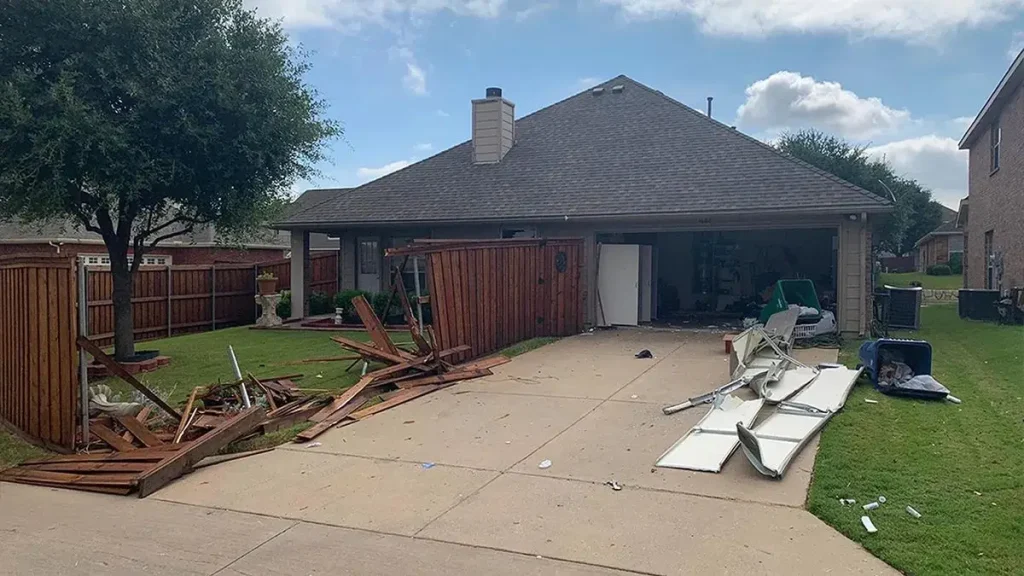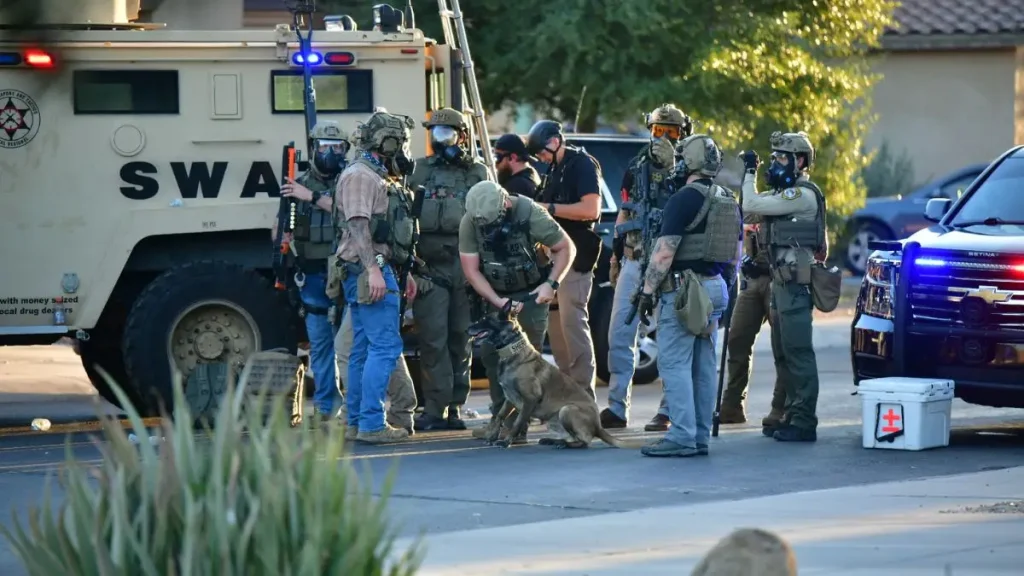Judge Rules in Favor of Texas Woman After SWAT Destroyed Her House While Pursuing Fugitive
Imagine you’re at home, just going about your day, when suddenly, a SWAT team crashes through your door, destroys your home, and leaves everything in ruins—all while chasing the wrong person. That’s exactly what happened to a Texas woman.
She had no idea that a dangerous fugitive was nearby. Yet, her life was turned upside down when the SWAT team mistakenly targeted her home. Walls were torn down, personal belongings ruined, and her privacy completely violated—all because of a mistake made during the pursuit.
You can probably imagine how terrifying that must have been for her. It wasn’t just a broken door—it was the destruction of everything she had worked for, all because of a situation she had no control over.
The Legal Battle – How the Woman Won Her Case
After the SWAT raid destroyed her home, this woman didn’t just accept the damage. She fought back—and let me tell you, that’s not something you see every day. Her name is Vicki Baker, a retired grandmother and cancer patient from McKinney, Texas, who found herself in a nightmare scenario.
Vicki was preparing to move to Montana, a new chapter in her life, when police suddenly showed up at her home. They were after a fugitive—her former handyman—who had barricaded himself inside her property. The problem? She had no idea he was even there, and the SWAT team’s brutal approach ended up destroying everything in sight.
Instead of just letting this injustice slide, Vicki decided to fight back. She took the case to court, arguing that her rights had been violated in the most shocking way. And guess what? The judge sided with her. As Fox News reported, the judge ruled that the state had caused “substantial harm,” and she was entitled to damages for the destruction.
Imagine being in her shoes for a moment—fighting back against the system and winning. It wasn’t just about the compensation. It was about standing up for what was right. If you were in her position, wouldn’t you feel the same?
The Role of the Texas Constitution in the Ruling
So, how did the woman win? The answer lies in the Texas Constitution. The law here is clear: no one should be subject to unreasonable searches or seizures. That includes having your house destroyed by a SWAT team without proper reason.
According to Dallas News, the court agreed that the SWAT team’s actions violated her rights. They didn’t have enough justification to cause that kind of damage. So, in the end, the court ruled in her favor.
Think about it: If you were in this woman’s place, wouldn’t you want to know that your rights protect you from such extreme actions? This case proves that even when law enforcement is involved, the law is supposed to keep citizens safe from unnecessary harm.
Impact of the Case on Law Enforcement and Citizens’ Rights

This case isn’t just about one woman—it’s about all of us. It’s a wake-up call for law enforcement and citizens alike. It’s pushing for a conversation about how far police can go during raids.
You might be wondering: How does this change things for us? Well, it raises serious questions about the way SWAT teams operate. If something like this can happen to one person, it could happen to anyone, right? And it’s not just about property damage; it’s about personal safety, trust, and how police handle their power.
If you think about it, this ruling could affect the way SWAT operations are carried out in the future. It could mean that police will have to rethink how they approach situations that involve force and destruction. And honestly, don’t you think that’s something worth considering?
It’s similar to how law enforcement actions have been called into question in other high-profile cases, like the Seattle man charged in a string of burglaries targeting NFL and MLB stars. These incidents raise important questions about how law enforcement handles sensitive situations and whether stricter oversight is necessary.
Calls for Reform in SWAT Raid Tactics
This case is making waves, and it’s starting a bigger conversation about the need for reform in how SWAT teams operate. You’ve probably heard a lot about police reform recently, and this case just adds fuel to that fire.
Experts are calling for stricter guidelines on when SWAT teams should be deployed. They argue that these extreme tactics should only be used in situations where there’s real danger—and even then, with care. I get it—when you think about the power a SWAT team holds, it makes sense to question whether enough safeguards are in place to prevent innocent people from getting hurt.
So, what do you think? Should there be more accountability before breaking down someone’s door like this? Does reform feel necessary to you after hearing this story? Tell your thoughts in the comments.
What Does This Mean for Future Cases?
So, you might be wondering, “What happens now? What does this case mean for others in the future?” Well, this legal victory isn’t just a one-off—it has the potential to set a powerful precedent for future cases.
This ruling could change how courts handle similar cases going forward. If you ever find yourself in a situation where your rights are violated in the same way, this case shows that the law can work in your favor, even if it’s an uphill battle. It could force law enforcement to be more cautious and accountable in their actions.
It makes you think: will we see more citizens challenging police overreach? Will this spark other legal battles? Time will tell, but it’s clear this case is pushing the conversation forward.
Speaking of protecting what matters most, just as people are starting to question how their homes are treated in legal situations like this, there’s a whole other side to safeguarding your space—like understanding trends around real estate and property.
Many public figures are often seen sharing about their personal spaces and homes on social media platforms like X, Facebook, and WhatsApp groups, where people discuss real estate in a real and transparent way. If you’re someone who’s interested in knowing more about these trends, these platforms could be a good place to stay connected.
Expert Opinions on the SWAT Raid Incident

What do the experts think about all this? It’s not just public opinion—law enforcement and legal professionals are also weighing in.
Experts in law enforcement have pointed out that this case shows a clear need for stricter guidelines around SWAT operations. Some say the SWAT team’s tactics were reckless, while others argue that the team acted in good faith, but just made a mistake.
On the other hand, civil rights lawyers are celebrating the win as a victory for ordinary people standing up against police overreach.
What’s your take on this? Do you think the experts are right in calling for reform, or should law enforcement have more flexibility in handling these situations? Tell me in the comments.
Victories and Future Steps for the Plaintiff
So, what happens now? The woman may have won her case, but there’s still a long road ahead. After the court ruling, the woman is entitled to damages—but it’s not just about compensation. It’s about holding the authorities accountable.
The case also gives her a platform to speak out about the importance of reform. She’s now become a symbol for those who’ve faced similar injustices. Her victory is only part of the story—it’s what happens next that could create even more lasting change.
So, what do you think? Is this victory enough, or should there be more action taken to prevent similar incidents in the future? Do you feel that the case will inspire real change in law enforcement tactics?
Conclusion
Now that you’ve seen the legal battle unfold, you might be asking: “Why does this matter to me?” Well, this case is about more than just one woman’s fight for justice—it’s a wake-up call for how we all need to think about our rights when it comes to law enforcement.
This case raises serious questions about the balance of power between police and citizens. If something like this can happen to her, it could happen to any of us. It forces us to ask: How far is too far when it comes to protecting the public? Are there enough checks in place to prevent abuse of power?
In the end, this isn’t just her story—it’s a story for all of us. It’s a reminder that we all have rights, and we need to make sure those rights are protected, no matter the situation. What do you think—should there be more safeguards to prevent cases like this? How do we ensure that our homes and lives are protected from such overreach?
Do you want to stay updated on cases like this one and law enforcement issues? Follow us for more insights and discussions.
Disclaimer: This article reflects the current understanding of the case and related events. Legal outcomes and interpretations may vary depending on jurisdiction and evolving law. Always seek professional advice for specific legal matters.


